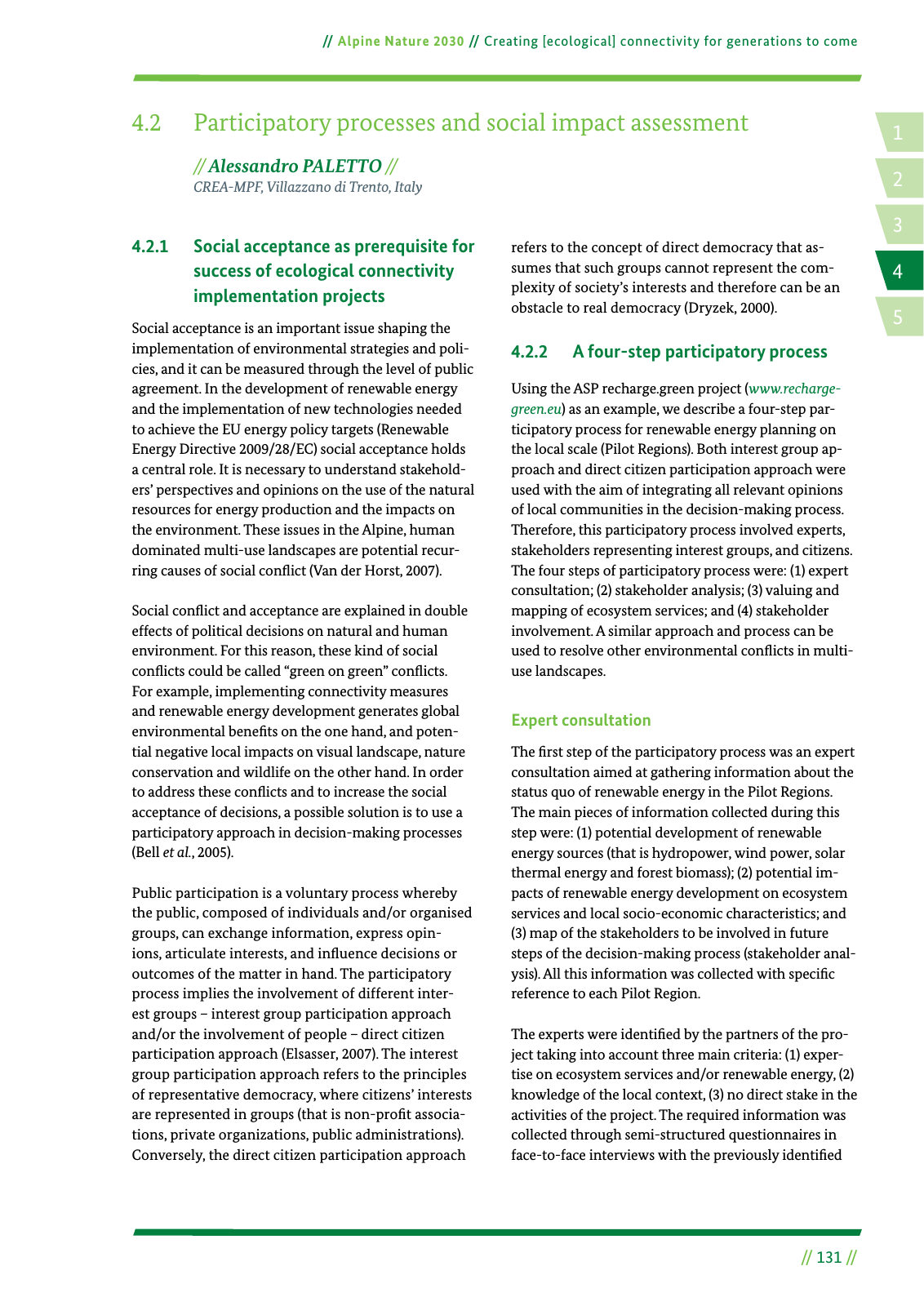14 2 5 3 Alpine Nature 2030 Creating ecological connectivity for generations to come 131 4 2 Participatory processes and social impact assessment Alessandro PALETTO CREA MPF Villazzano di Trento Italy 4 2 1 Social acceptance as prerequisite for success of ecological connectivity implementation projects Social acceptance is an important issue shaping the implementation of environmental strategies and poli cies and it can be measured through the level of public agreement In the development of renewable energy and the implementation of new technologies needed to achieve the EU energy policy targets Renewable Energy Directive 2009 28 EC social acceptance holds a central role It is necessary to understand stakehold ers perspectives and opinions on the use of the natural resources for energy production and the impacts on the environment These issues in the Alpine human dominated multi use landscapes are potential recur ring causes of social con ict Van der Horst 2007 Social con ict and acceptance are explained in double effects of political decisions on natural and human environment For this reason these kind of social con icts could be called green on green con icts For example implementing connectivity measures and renewable energy development generates global environmental bene ts on the one hand and poten tial negative local impacts on visual landscape nature conservation and wildlife on the other hand In order to address these con icts and to increase the social acceptance of decisions a possible solution is to use a participatory approach in decision making processes Bell et al 2005 Public participation is a voluntary process whereby the public composed of individuals and or organised groups can exchange information express opin ions articulate interests and in uence decisions or outcomes of the matter in hand The participatory process implies the involvement of different inter est groups interest group participation approach and or the involvement of people direct citizen participation approach Elsasser 2007 The interest group participation approach refers to the principles of representative democracy where citizens interests are represented in groups that is non pro t associa tions private organizations public administrations Conversely the direct citizen participation approach refers to the concept of direct democracy that as sumes that such groups cannot represent the com plexity of society s interests and therefore can be an obstacle to real democracy Dryzek 2000 4 2 2 A four step participatory process Using the ASP recharge green project www recharge green eu as an example we describe a four step par ticipatory process for renewable energy planning on the local scale Pilot Regions Both interest group ap proach and direct citizen participation approach were used with the aim of integrating all relevant opinions of local communities in the decision making process Therefore this participatory process involved experts stakeholders representing interest groups and citizens The four steps of participatory process were 1 expert consultation 2 stakeholder analysis 3 valuing and mapping of ecosystem services and 4 stakeholder involvement A similar approach and process can be used to resolve other environmental con icts in multi use landscapes Expert consultation The rst step of the participatory process was an expert consultation aimed at gathering information about the status quo of renewable energy in the Pilot Regions The main pieces of information collected during this step were 1 potential development of renewable energy sources that is hydropower wind power solar thermal energy and forest biomass 2 potential im pacts of renewable energy development on ecosystem services and local socio economic characteristics and 3 map of the stakeholders to be involved in future steps of the decision making process stakeholder anal ysis All this information was collected with speci c reference to each Pilot Region The experts were identi ed by the partners of the pro ject taking into account three main criteria 1 exper tise on ecosystem services and or renewable energy 2 knowledge of the local context 3 no direct stake in the activities of the project The required information was collected through semi structured questionnaires in face to face interviews with the previously identi ed

Hinweis: Dies ist eine maschinenlesbare No-Flash Ansicht.
Klicken Sie hier um zur Online-Version zu gelangen.
Klicken Sie hier um zur Online-Version zu gelangen.